- Home
- Raymond Benson
Doubleshot Page 3
Doubleshot Read online
Page 3
“Besides,” she had added, almost as an afterthought, “I expect my people to be in top physical shape. And you’re nowhere near that.”
Now he was doubly anxious to get back into action. It was the only thing that could shake him out of the malaise … the depression … that he felt himself drowning in. It happened to him every once in a great while. Bond had seriously slipped off the deep end once, after the murder of his wife, Tracy. The previous M had been forced to send his top agent for psychiatric evaluation and then off to Japan on a mission in the hopes that Bond would pull himself out of the well of despair he had fallen into.
If only he felt better. The damned headache had crept up on him and was now excruciating. The events in the Himalayas had certainly taken their toll on him. Besides the fatigue, which never seemed to improve, he suffered from various aches and pains. Worst of all were the frequent headaches, which tended to begin midday and continue well into the night. His sleep patterns were disturbed, he had fitful dreams, felt bouts of inexplicable anxiety, and had taken to drinking more. He also felt unusually paranoid for the first time in his life. Ever since returning from Nepal, Bond had sensed that he was being watched, although he had used every trick in the book to determine if that was true. So far he hadn’t been able to substantiate his suspicion and he was afraid he was imagining things.
The most alarming event was the blackout incident that had occurred while he had been recuperating in Jamaica. He had been about to take a leisurely swim in the private cove behind Shamelady, when he suddenly felt disoriented. His heart had begun to pound mercilessly and a blanket of dread enveloped him. For a moment he thought he was having a heart attack. He had stumbled back to the shore and had collapsed onto the sand. The next thing he knew, Ramsey, his Jamaican housekeeper and cook, was shaking him.
At that point, Bond had known there was something seriously wrong with him. He had immediately made arrangements to return to London and see Sir James.
Bond approached Royal Avenue and sat heavily on a bench, staring at the street, watching the buses, taxis, and people go by. Bond felt removed from the scene, almost as if he were floating out-of-body. It was an unfamiliar, disconcerting sensation.
Should he go back to the doctor? Sir James was still away on some kind of tour, so he would have to see Sir James’s colleague, Dr. Feare, again.
Bond remembered the appointment with the neurologist a month ago. When he had arrived at Molony’s office on Harley Street, he was surprised to find that Molony was on an extended, worldwide lecture tour as a guest neurologist. Miss Reilly, the unpleasant, middle-aged woman who served as the clinic’s nurse, informed Bond that he would have to see Molony’s relatively new assistant, who had introduced herself as Dr. Kimberley Feare. Bond was taken aback, for Dr. Feare was petite, blond, and extremely attractive.
“How long have you worked for Dr. Molony?” he had asked.
“Not long. I was lucky to get the job. Sir James is probably the best neurologist in the world. He’s in India at the moment, and he’s working his way west toward Africa,” she said in a girlish, playful voice. Bond liked her immediately. “Now, what can I do for you, Mr. Bond? I understand your file is classified. You’re with SIS, am I right?”
“That’s right.”
“Then the only other person outside this office who shall see my report will be your chief,” she said, making a note in the folder. “As you know, we’re very careful about confidentiality with government civil servants.”
Bond went through the examination, X rays, an EEG, and returned a day later for a CAT scan. After he had described his various Himalayan injuries to Dr. Feare, she suspected that he might have some damage to his skull. At one point during the expedition up the third tallest mountain in the world, Bond had been hit on the head and knocked unconscious. Exacerbated by the oxygen deprivation at high altitude, the injury could be the cause of the headaches; there might be a blood clot, a crack in the skull, or any number of ailments associated with a blowto the head. The tests came back with somewhat alarming news. The EEC had picked up a lesion on the temporal lobe of Bond’s brain. Dr. Feare was of the opinion that it wasn’t terribly serious, but the blackout in Jamaica was probably a result of “post-traumatic epilepsy.” Although it was a rare condition, it wasn’t extraordinary. It was possible, however, that it could occur again without warning.
“With this kind of thing, we could perform a little surgery and remove the lesion with a laser,” she had said. “But that’s a last resort. I think we should first try to get rid of it with medication and rest.
Pure and simple.”
Dr. Feare gave Bond an additional diagnosis of “too much stress,” and recommended to M that he take it easy—for at least three months. She had prescribed carbamazepine and painkillers and told him to take two tablets at lunchtime and two before bedtime. Dr. Feare warned him that if things hadn’t improved in three months, surgery might be the next step. The worst thing about it was that he was forbidden to drive. He wasn’t supposed to drink alcohol, either, but Bond ignored that directive.
Unfortunately, the pills didn’t work at all. Bond had been struggling with the intense pain in the back of his head for months now, and it was driving him mad. There was only one thing to do—go back to see Dr. Feare.
Bond stood and continued the stroll toward the square lined with plane trees, where for many years he had owned a comfortable flat on the ground floor of a converted Regency house.
He was convinced that a mission was the only thing that could bring him back on track. It had always worked in the past. The only way he could put the demons to rest was to go after the Union and, if possible, destroy the entire organization. If M wouldn’t put him on the assignment, then by God he would just have to do it himself. It wouldn’t be the first time he had deliberately disobeyed orders. It would be for the good of SIS and Britain. The Union was the most evil menace to threaten international law and order since his old enemies, SPECTRE. Its members had to be smoked out and exterminated like pests.
But Bond knew that he was not in good shape, and it made him irate. He was well aware that the Union was out there, waiting for the right moment. Bond was probably the number-one man on their hit list after what he did to their organization in the Himalayas. He should be prepared for a surprise attack, and he wasn’t. It could occur at any time. Bond knew that if he didn’t do something about his vulnerability soon, he just might be spending his next holiday in the morgue.
Lost in thought, Bond ambled up the street, closer to his home, when he suddenly noticed a familiar woman walking toward him. She had shoulder-length golden hair, blue eyes, and shocking-pink lips. The woman looked past him and kept walking, but Bond was paralyzed with shock.
It was his dead wife, Tracy!
Bond closed his eyes tightly and opened them. He turned to watch her walk away from him, and then realized that it wasn’t her after all. Of course it wasn’t. How could it be?
Shaken by the experience, Bond continued his walk, but he felt his heart pounding. He was perspiring heavily, and it was not a warm day. What the hell was wrong? he asked himself.
He had imagined it. That was the only explanation. He chalked the hallucination up to his fatigue, stress, and the headaches. He had been thinking a lot about Helena, and that was probably the catalyst. Sure, that was it.
Best to get home and have a nap.
Bond increased his pace until he was a block away from his street. He was stopped at the intersection by a traffic light. He glanced at his wristwatch again: 1:33. He had taken twenty minutes to walk what normally took him five. He had better snap out of it!
While waiting for the light to change, Bond casually looked across King’s Road to the other side of the street. A man was standing on the corner, staring right at him. He was tall, had dark hair, and … NO!
Bond suddenly felt dizzy and disoriented. His heart felt as if it was going to push itself through his chest. His mouth grew dry and he had trouble
swallowing.
The man across the street was himself, or at least he looked like himself. He wasn’t moving; he just stood staring right at Bond!
A bus passed by, momentarily blocking Bond’s view of the opposite side of the street. When the bus had gone, Bond saw that there was now no one on the corner. Bond ran across the street, dodging traffic, and began to look for the man, but he didn’t see anyone remotely resembling him.
His head was throbbing in pain and he felt sick.
Bond’s mind flashed briefly on the fortune cookie from the Chinese restaurant.
Meeting your double means certain death.
His eyes were playing tricks on him, he told himself.
Bond stumbled as he attempted to cross back to his side of the street. A taxi almost hit him and the horn blared loudly. A very unpleasant, suffocating feeling of anxiety rushed over him and locked around his chest cavity. He gasped for breath, felt a sharp pain in the back of his head, and reached out for a phone box for support.
Instead, he crashed to the pavement.
When Bond opened his eyes, he was in his favorite armchair in the sitting room of his flat. The old-fashioned white and gold Cole wallpaper and deep red curtains gave him a feeling of serenity at first, but then he bolted upright in fright.
How the hell did I get here?
His hands were shaking now. He carefully stood and tested his balance. Nothing wrong there. The dizziness he had felt earlier was gone. He looked at his watch.
It was 2:47.
My God! He had lost over an hour!
Had he walked home and let himself in without remembering any of it? He had heard of people having these extended blackouts and not recalling anything that happened during the period of time they were “out of it.” In actuality, these people carried on mechanically, often finding themselves in a different location from where they were when the blackout first occurred.
Bond immediately went to the cupboard, removed a bottle of Scotch, dropped two ice cubes into a glass, and filled it. He took a long, burning draught, then sat back in the armchair.
Now he knew something was really wrong with him. He had just had a second blackout and didn’t have a clue what had happened in the interim.
FOUR
CHASING CLUES
BOND RECALLED HIS APPOINTMENTS WITH DR. FEARE. HE HAD ANSWERED ALL her questions negatively, including “Have you had any other fainting spells or perhaps hallucinations since the incident in Jamaica?”
At the time, his answers had been the truth. But now? He had experienced both in one day!
And what about the man he had seen on the street? Had the man really looked like him? Had he been a hallucination, like the woman who had resembled Tracy?
Bond was aware of the supernatural concepts of doubles, or doppelgängers, and that supposedly they were apparitions of living persons. Popular occult theory held that a double was a projection of an astral body. English and Irish folklore called the phenomenon a “fetch,” and, as the fortune cookie warned, seeing one’s fetch indeed meant that one was going to die. Legend had it that Shelley saw his double before his death by drowning.
But Bond never bothered with superstitions. There had to be another explanation.
Dr. Feare had told him to come back and see her if there were any change, especially if he began to have new symptoms or if the headaches got worse. Bond had to admit that both of these conditions were true.
Bond was very concerned, playing possible scenarios in his head.
His mind raced frantically as he considered every alternative for the future and simultaneously attempted to calm down. But what if it was all in his mind and he was finally going mad after all these years of living on the edge?
Bond threw the glass of whiskey across the room. The glass shattered against the wall.
To hell with it! All he needed was an attitude adjustment.
He decided to go to the office and dig into Helena’s case and track down the Union members who had recruited her in London. That should keep his mind focused. First, though, he would call Dr. Feare.
He paused a moment as he considered a positive aspect in having to go to the doctor again. Dr. Feare—Kimberley—was a gorgeous woman. Perhaps all he needed was some female companionship for a night. Since Helena’s death, Bond had been celibate. Two months is a long time. His close friend in America, Felix Leiter, would have simply advised, “James, my boy, all you really need is to get laid.”
He looked up her number and picked up the phone. When Miss Reilly answered, Bond asked to speak with the doctor personally.
“Dr. Feare is in surgery. You’ll have to leave a message,” the nurse snapped.
“Will she get it today?”
“I should think so.”
“Fine. This is James Bond. I saw her a little over a month ago. I would like to see her again. It’s rather urgent.”
“Would you like to make an appointment? If so, I’ll have to call you back.”
“Please. As soon as possible.” He left the phone number for his answering service.
Adhering to the no-driving rule, Bond took a taxi to SIS headquarters on the Thames and arrived at 3:30 in the afternoon. When he walked past the security officer and through the X ray, Bond suddenly realized that he must look terrible. He hadn’t bothered to shave that morning, and his casual clothes—a Sea Island cotton shirt, navy trousers, and a light-gray jacket—were a bit wrinkled.
Bond ignored the guard’s stare and went straight to the lift. He strode onto his floor and was grateful that no one was about. It was fortunate that the offices were rarely occupied, as Double-O agents were usually abroad, and the secretarial pool was very small.
Bond slipped into his small, uncluttered office, and sat at the desk. Two folders from Records were sitting on top of his “IN” tray. Bond took them and saw that they were an update on the investigation into Helena’s murder and the latest file on the Union. The former hadn’t been sealed, but it was hardly helpful. Everything had been turned over to the Metropolitan Police, who were in charge of the case. Bond noted the contact name at New Scotland Yard and picked up the phone.
“Howard,” the man answered.
“Detective Inspector Howard?” Bond asked.
“Yes, who’s calling?”
“This is James Bond at SIS.”
“Oh yes, Commander Bond, how are you?” Detective Inspector Howard had met Bond while investigating the murder of M’s friend, Alfred Hutchinson, a while back.
“Fine, thanks. I’d like to have a word with you. It’s rather urgent. Are you free this afternoon?”
Howard paused to check his diary. “I could see you at five o’clock, but I’ll only have fifteen minutes or so. Will that do?”
“That’s fine, I’ll see you then. Thank you.”
Bond hung up and felt somewhat gratified that at least someone capable was on the case. Stuart Howard was a good man.
He turned his attention to the other folder, which was actually a thick binder containing a hard-copy collection of information, images, and the latest intelligence from SIS’s Visual Library file on the Union.
There hadn’t been much progress in unveiling the Union’s mysteries since Bond first became involved in their cases. The report reiterated what he already knew: Taylor Michael Harris, an American militant in Portland, Oregon, created the Union circa 1993–1995. A self-professed white supremacist, Harris was arrested in 1993 for disturbing the peace during a rally that became violent and was run out of the state. He returned six months later with a large amount of capital, and with this money he founded the Union. Harris had apparently gone into business with unknown partners from the Middle East and North Africa.
He used specialist magazines to advertise for “mercenaries” to carry out dangerous jobs in Third World countries. Surprisingly, a great deal of men applied, looking for work as soldiers of fortune. After a six-month advertising campaign, it was estimated that nearly a thousand men had joined the organi
zation. They trained at the Oregon facility, but no jobs were carried out before the FBI raided the place in December 1996 for illegal arms possession and distribution. Taylor Harris had been gunned down, gangland-style, in a Portland restaurant a month earlier, believed to be murdered by his own lieutenants. These three men, Samuel Anderson, James Powers, and Julius Wilcox, fled the country, and at least one of them was a suspect in the murder. The killer had paused in the restaurant long enough to slit Harris’s throat from ear to ear: an act that became the Union trademark.
Harris’s organization, however, lived on. Whether or not the three lieutenants were responsible for keeping it going, no one was certain.
It became a more sinister organization after publicly taking responsibility for several serious terrorist acts committed between 1997 and 1999. No longer merely a band of “soldiers of fortune,” the Union became an international network of spies, killers, and militants. They were particularly adept at infiltrating intelligence organizations. The Union quickly became one of the most dangerous organized crime syndicates in the world, on a par with the Italian and Russian mafias, Chinese Triads, and SPECTRE. SIS had experienced a serious encounter with the Union within the last year, and Bond could attest to their loyalty, tenacity, and dangerousness.
Discovering the location of their headquarters was a top priority for SIS, the CIA, and other intelligence organizations. Recent reports from America indicated that the Union was probably located in North Africa, perhaps in Morocco or Algeria.
Bond did find something new in the folder. Interrogation of a Union member who had been arrested in France after a nasty bank bombing revealed that the Union’s leader was someone they called Le Gérant. The prisoner claimed that no one knew whom he really was, not even the “commanders” who made up the “inner circle” of underlings. The Union was structured much like a mafia, with an executive boss, a number of immediate subordinates—the cercle fermé—and branches of groups and leaders extending from there. It was valuable information, but before any further interrogation could be performed, the prisoner had managed to hang himself in his cell.

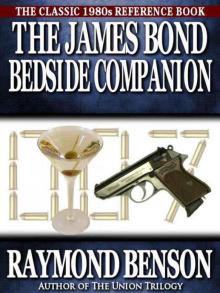 The James Bond Bedside Companion
The James Bond Bedside Companion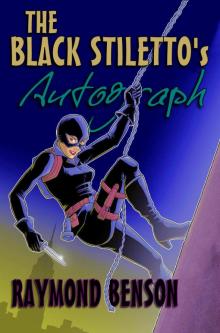 The Black Stiletto's Autograph
The Black Stiletto's Autograph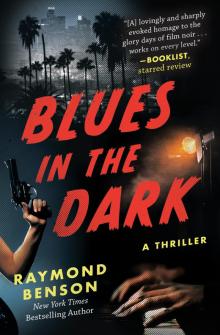 Blues in the Dark
Blues in the Dark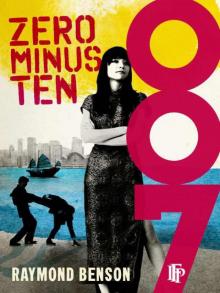 Zero Minus Ten
Zero Minus Ten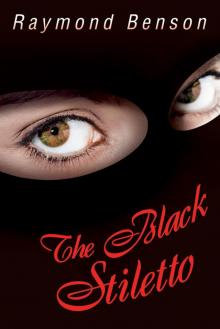 The Black Stiletto
The Black Stiletto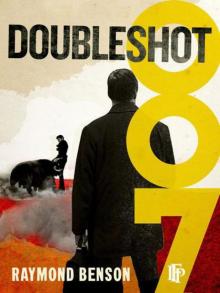 Doubleshot
Doubleshot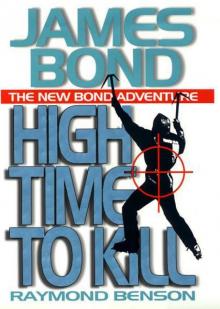 High Time To Kill rbb-3
High Time To Kill rbb-3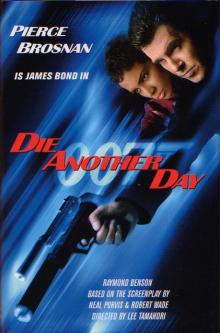 Bond Movies 07 - Die Another Day
Bond Movies 07 - Die Another Day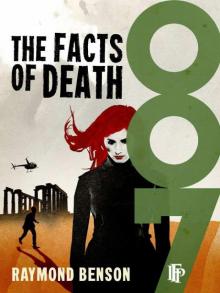 The Facts Of Death
The Facts Of Death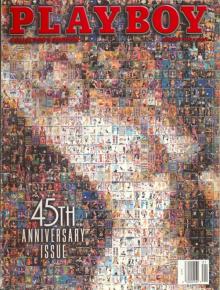 Midsummer Night's Doom
Midsummer Night's Doom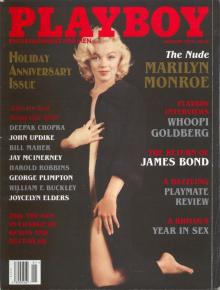 Blast from the Past
Blast from the Past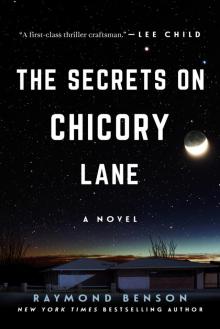 The Secrets on Chicory Lane
The Secrets on Chicory Lane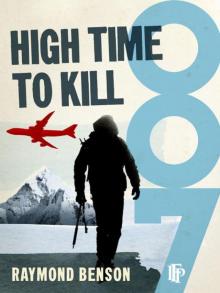 High Time To Kill
High Time To Kill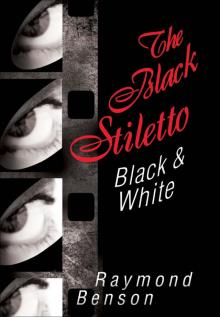 The Black Stiletto: Black & White
The Black Stiletto: Black & White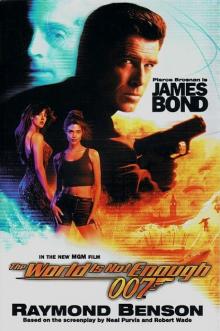 The World Is Not Enough jb-1
The World Is Not Enough jb-1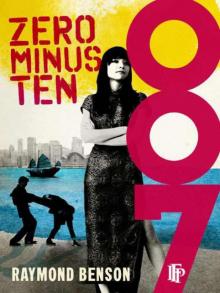 Zero Minus Ten rbb-1
Zero Minus Ten rbb-1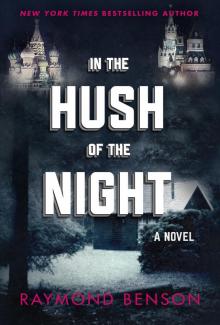 In the Hush of the Night
In the Hush of the Night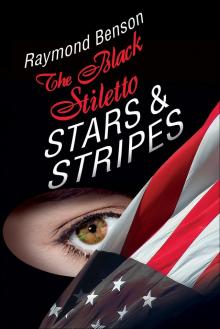 The Black Stiletto: Stars & Stripes
The Black Stiletto: Stars & Stripes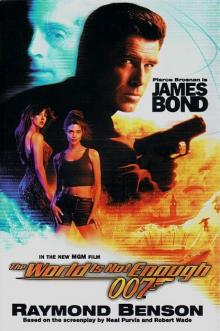 Bond Movies 06 - The World Is Not Enough
Bond Movies 06 - The World Is Not Enough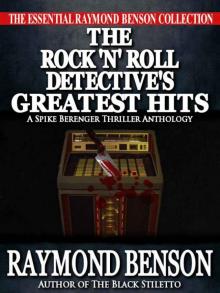 The Rock 'n Roll Detective's Greatest Hits - A Spike Berenger Anthology
The Rock 'n Roll Detective's Greatest Hits - A Spike Berenger Anthology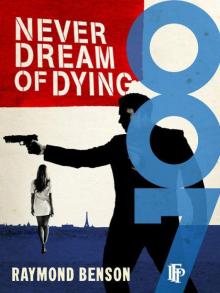 Never Dream Of Dying
Never Dream Of Dying